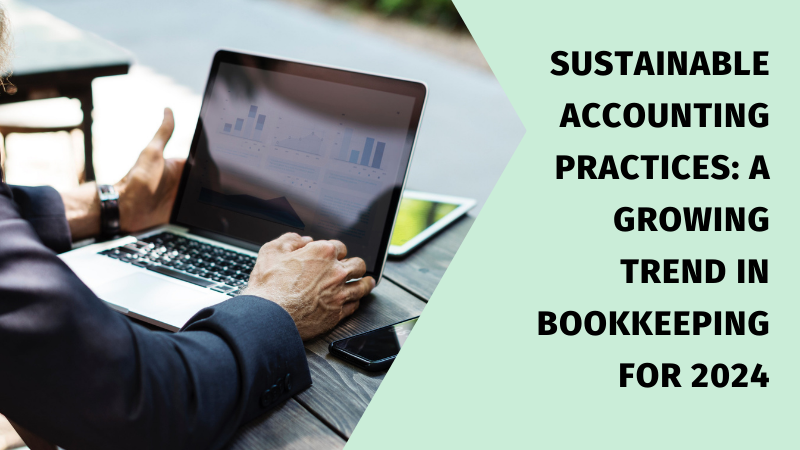Sustainable Accounting Practices: A Growing Trend in Bookkeeping for 2024

In recent years, the focus on sustainability has grown from a niche concern to a central element in business operations and strategy. This shift is reflected in the evolution of accounting practices. Sustainable accounting, also known as environmental, social, and governance (ESG) accounting, integrates traditional financial metrics with non-financial data related to environmental and social impacts. This comprehensive approach is essential for businesses that aim to demonstrate their commitment to sustainability and for investors who seek to understand the full scope of a company’s performance. As we move through 2024, sustainable accounting practices are not just a trend; they are becoming a standard in bookkeeping and financial reporting.
The Emergence of Sustainable Accounting
Historical Context
Sustainable accounting’s roots can be traced back to the broader concept of corporate social responsibility (CSR), which emerged in the 1960s and 1970s. Initially, CSR focused on philanthropic activities and ethical business conduct. Over time, the scope of CSR expanded to include environmental stewardship, social equity, and good governance practices. By the early 2000s, the integration of these principles into accounting practices began to take shape, giving rise to what we now recognize as sustainable accounting.
Driving Forces Behind Sustainable Accounting
Several factors have contributed to the rise of sustainable accounting:
- Regulatory Pressure: Governments and regulatory bodies worldwide are increasingly mandating disclosures related to environmental and social impacts. For example, the European Union’s Non-Financial Reporting Directive (NFRD) requires large companies to report on various sustainability metrics.
- Investor Demand: Investors are increasingly prioritizing ESG factors in their decision-making processes. They recognize that companies with strong sustainability practices are better positioned to manage risks and capitalize on opportunities in the long term.
- Consumer Expectations: Consumers are more informed and concerned about the ethical practices of the companies they support. Brands that demonstrate a commitment to sustainability can enhance their reputation and customer loyalty.
- Operational Efficiency: Sustainable practices often lead to cost savings and operational efficiencies. For instance, reducing energy consumption or waste can lower operational costs while contributing to environmental goals.
Principles of Sustainable Accounting
Sustainable accounting is grounded in several key principles that distinguish it from traditional accounting:
- Materiality: Identifying and focusing on the sustainability issues that are most relevant to the business and its stakeholders. Materiality assessments help prioritize reporting on the most significant impacts.
- Stakeholder Inclusiveness: Engaging with various stakeholders, including investors, employees, customers, and communities, to understand their concerns and expectations regarding sustainability.
- Transparency: Providing clear, accurate, and comprehensive information about the company’s sustainability performance. Transparency builds trust and enables stakeholders to make informed decisions.
- Consistency and Comparability: Ensuring that sustainability data is reported consistently over time and can be compared with other companies. Standardized frameworks and metrics are essential for achieving this goal.
- Accountability: Holding the company accountable for its sustainability commitments and performance. This includes setting clear targets, measuring progress, and taking corrective actions when necessary.
Key Components of Sustainable Accounting
Sustainable accounting encompasses a broad range of practices and metrics that address environmental, social, and governance issues. Here, we delve into the key components that define sustainable accounting in 2024.
Environmental Accounting
Environmental accounting focuses on measuring and reporting the environmental impacts of a company’s operations. This includes:
- Carbon Accounting: Tracking and reporting greenhouse gas (GHG) emissions, including direct emissions (Scope 1), indirect emissions from purchased electricity (Scope 2), and other indirect emissions (Scope 3). Companies use carbon accounting to understand their carbon footprint and implement strategies to reduce emissions.
- Resource Usage: Monitoring the consumption of natural resources such as water, energy, and raw materials. Efficient resource usage is crucial for reducing environmental impact and operational costs.
- Waste Management: Reporting on waste generation, disposal methods, and recycling efforts. Effective waste management can minimize environmental harm and contribute to circular economy initiatives.
- Environmental Impact Assessments: Evaluating the potential environmental impacts of new projects or expansions. These assessments help identify and mitigate adverse effects on ecosystems and communities.
Social Accounting
Social accounting addresses the social impacts of a company’s activities, focusing on the well-being of employees, customers, communities, and other stakeholders. Key aspects include:
- Labor Practices: Reporting on employment practices, including fair wages, working conditions, diversity and inclusion, and employee health and safety. Companies that prioritize positive labor practices can enhance employee satisfaction and productivity.
- Human Rights: Ensuring that business operations respect human rights, both within the company and throughout the supply chain. This includes avoiding child labor, forced labor, and discrimination.
- Community Engagement: Assessing and reporting on the company’s impact on local communities. This can include community development initiatives, philanthropy, and efforts to minimize negative social impacts.
- Product Responsibility: Ensuring that products are safe, of high quality, and produced ethically. This includes reporting on product recalls, customer satisfaction, and responsible marketing practices.
Governance Accounting
Governance accounting focuses on the structures, policies, and practices that ensure a company is managed ethically and effectively. Key governance metrics include:
- Board Composition: Reporting on the diversity, independence, and expertise of the board of directors. A well-structured board can provide effective oversight and strategic guidance.
- Executive Compensation: Disclosing executive pay and aligning it with the company’s performance and sustainability goals. Transparency in compensation practices helps build trust with stakeholders.
- Risk Management: Identifying and managing risks related to sustainability, including regulatory changes, reputational risks, and operational disruptions. Robust risk management practices are essential for long-term resilience.
- Ethical Conduct: Reporting on policies and practices related to ethical conduct, including anti-corruption measures, compliance with laws and regulations, and corporate governance frameworks.
The Role of Technology in Sustainable Accounting
Technology plays a pivotal role in advancing sustainable accounting practices. Innovations in data collection, analysis, and reporting enable companies to track and disclose their sustainability performance more accurately and efficiently.
Data Collection and Management
Modern technology solutions streamline the collection and management of sustainability data. Internet of Things (IoT) devices, for instance, can monitor energy usage, emissions, and resource consumption in real-time. This data can be integrated into centralized systems, providing a comprehensive view of the company’s environmental impact.
Data Analysis and Reporting
Advanced analytics and artificial intelligence (AI) enable companies to analyze large volumes of sustainability data and derive actionable insights. Predictive analytics can help forecast future sustainability trends and identify areas for improvement. AI-powered tools can also automate the generation of sustainability reports, ensuring accuracy and consistency.
Blockchain for Transparency
Blockchain technology offers a secure and transparent way to track and verify sustainability data. By creating immutable records of transactions and data points, blockchain can enhance the credibility of sustainability disclosures and prevent greenwashing.
Cloud-Based Platforms
Cloud-based platforms facilitate collaboration and data sharing across different departments and stakeholders. These platforms enable companies to integrate sustainability data into their overall business strategy and decision-making processes.
Standards and Frameworks for Sustainable Accounting
Standardized frameworks and guidelines are essential for ensuring consistency and comparability in sustainability reporting. Several key standards and frameworks have emerged to guide companies in their sustainable accounting practices:
Global Reporting Initiative (GRI)
The GRI Standards are among the most widely used frameworks for sustainability reporting. They provide detailed guidelines on how to report on various sustainability topics, including environmental impact, social responsibility, and governance practices. The GRI Standards emphasize materiality and stakeholder inclusiveness, helping companies focus on the most relevant issues.
Sustainability Accounting Standards Board (SASB)
The SASB Standards focus on industry-specific sustainability metrics that are financially material. These standards help companies identify and disclose the sustainability issues that are most likely to impact their financial performance. By aligning sustainability reporting with financial reporting, the SASB Standards facilitate better integration of ESG factors into business strategy and decision-making.
Task Force on Climate-related Financial Disclosures (TCFD)
The TCFD provides recommendations for disclosing climate-related financial risks and opportunities. The TCFD framework emphasizes the importance of governance, strategy, risk management, and metrics and targets in addressing climate-related issues. By adopting the TCFD recommendations, companies can improve their climate resilience and provide investors with decision-useful information.
Integrated Reporting (IR)
The Integrated Reporting framework, developed by the International Integrated Reporting Council (IIRC), promotes the integration of financial and non-financial information in a single report. This approach helps companies communicate how they create value over time and demonstrate the interconnectedness of their financial, environmental, and social performance.
Benefits of Sustainable Accounting
Implementing sustainable accounting practices offers several benefits for companies, investors, and other stakeholders:
Enhanced Reputation and Trust
Companies that prioritize sustainability and transparently report their performance can build stronger relationships with stakeholders. Enhanced reputation and trust can lead to increased customer loyalty, employee satisfaction, and investor confidence.
Improved Risk Management
Sustainable accounting helps companies identify and manage risks related to environmental, social, and governance issues. By proactively addressing these risks, companies can reduce the likelihood of regulatory fines, reputational damage, and operational disruptions.
Access to Capital
Investors are increasingly incorporating ESG factors into their investment decisions. Companies that demonstrate strong sustainability performance are more likely to attract investment from socially responsible investors and access capital at favorable terms.
Operational Efficiency and Cost Savings
Sustainable practices often lead to greater operational efficiency and cost savings. For example, reducing energy consumption, minimizing waste, and optimizing resource usage can lower operational costs while benefiting the environment.
Long-Term Value Creation
Sustainable accounting encourages companies to focus on long-term value creation rather than short-term profits. By considering the broader impacts of their operations, companies can build more resilient and sustainable business models.
Challenges and Future Directions
Despite the numerous benefits, implementing sustainable accounting practices is not without challenges. Companies must navigate complex regulatory requirements, collect and manage vast amounts of data, and ensure the accuracy and credibility of their sustainability disclosures.
Data Collection and Quality
Collecting high-quality sustainability data can be challenging, especially for companies with complex supply chains and diverse operations. Ensuring data accuracy and consistency requires robust data management systems and processes.
Regulatory Compliance
Compliance with evolving regulatory requirements can be a daunting task. Companies must stay abreast of changes in sustainability reporting standards and ensure that their disclosures meet regulatory expectations.
Integration with Financial Reporting
Integrating sustainability data with traditional financial reporting requires a shift in mindset and practices. Companies must develop new methodologies and metrics to capture the full spectrum of their performance.
Avoiding Greenwashing
Greenwashing, or the practice of making misleading claims about sustainability, can undermine the credibility of sustainability disclosures. Companies must ensure that their reports are accurate, transparent, and reflective of their actual performance.
Future Directions
Looking ahead, several trends are likely to shape the future of sustainable accounting:
- Harmonization of Standards: Efforts to harmonize sustainability reporting standards are underway, aiming to create a more consistent and comparable reporting landscape. This harmonization will facilitate better integration of sustainability data into business decision-making.
- Increased Use of Technology: Technological advancements will continue to enhance data collection, analysis, and reporting capabilities. AI, blockchain, and IoT technologies will play a crucial role in improving the accuracy and transparency of sustainability disclosures.
- Greater Focus on Social and Governance Issues: While environmental issues have traditionally dominated sustainability reporting, there is a growing recognition of the importance of social and governance factors. Companies will increasingly report on issues such as diversity, equity, and inclusion, as well as ethical governance practices.
- Integration with Business Strategy: Sustainable accounting will become more deeply integrated into overall business strategy and decision-making processes. Companies will use sustainability data to drive innovation, improve operational efficiency, and create long-term value.
Conclusion
Sustainable accounting is no longer a peripheral concern; it is becoming a central element of modern business practices. As we move through 2024, companies are increasingly recognizing the importance of integrating environmental, social, and governance factors into their accounting and reporting processes. By adopting sustainable accounting practices, companies can enhance their reputation, improve risk management, attract investment, and create long-term value. The continued evolution of technology, standards, and regulatory requirements will shape the future of sustainable accounting, driving greater transparency, accountability, and sustainability in the business world.









